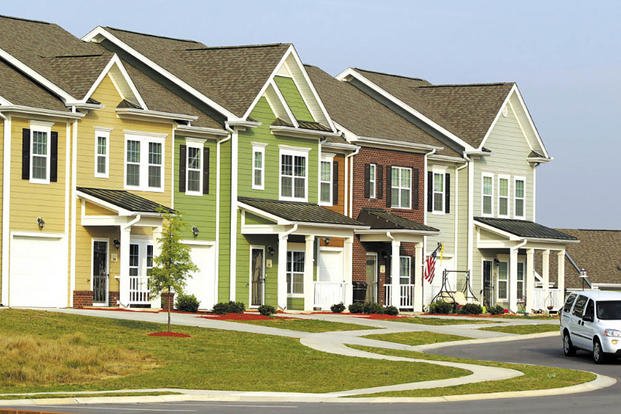Living in base housing isn't just for active-duty military personnel. Retirees, civilians, and other eligible individuals can also take advantage of the benefits that come with moving onto a military base. Here’s what you need to know about making this housing option a reality.
Specifically, the general public can live in "privatized military housing."
Can Civilians Live on Base?
As part of the base housing privatization process legislated by Public Law 104-106, the Defense Department says that, when the number of vacant homes on any base rises above a certain level, the contractor can rent them to anyone it likes. The program is available on only some bases. Check with your local housing office for details.
Related: Service members and veterans have many options when seeking a VA Loan. Calculate your rate in minutes with our VA Loan Calculator.
While all of the housing areas are different -- some have yard maintenance and utilities included, while some don't; some will rent only to DoD civilians and military retirees, while others may rent to anyone; each housing company has its own set of rules, but they generally follow the federal guidelines.
Living on base comes with several benefits. They offer high levels of security; a sense of community with support networks; and amenities such as gyms, pools, parks, and recreational facilities. You can also take advantage of being close to facilities like commissaries, exchange stores and medical services to make daily life more convenient.
If you're interested in living in a place where you may not have to worry about home or yard maintenance, paying utility bills or homeowners association fees, base housing may be for you. In fact, some of the companies that run the privatized housing call living on base "the ultimate gated community."
You normally lease a house for one year at a time. Military families get first dibs on any available housing, so if you are living there and your lease comes up for renewal, you may have to move to make room for an active-duty family.
To qualify, you must pay for a credit and background check for each adult living in the home and show proof of employment and income. You also have to pay a security deposit.
What does that mean for active-duty members? Well, since all military housing in the U.S. is undergoing the privatization process, your next on-base neighbor just could be a retiree with grandchildren your age; maybe they could be babysitters.
While much of the privatized housing is outside the gates, some of it is actually on base. If you live in housing located inside the gates, you get a base access card that is good for the term of your lease. This would get you through the gates but not give you access to the commissary, exchange or other facilities that require a military ID card.
The rent is usually based on the local Basic Allowance for Housing, but can be much less than comparable homes in the area. And the fact that utilities may be paid, maintenance is included, the housing is pet-friendly, and much of it is pretty new makes living on base a good option for some people.
If you are a DoD civilian working on base, it may be a very good deal -- cutting your commute time and allowing you to live near people with similar interests. If you're a retiree, it will make shopping on base and visiting medical facilities that much easier, but remember that your neighbors may be much younger than you.
Stay on Top of Your Veteran Benefits
Military benefits are always changing. Keep up with everything from pay to health care by subscribing to Military.com, and get access to up-to-date pay charts and more with all latest benefits delivered straight to your inbox.





